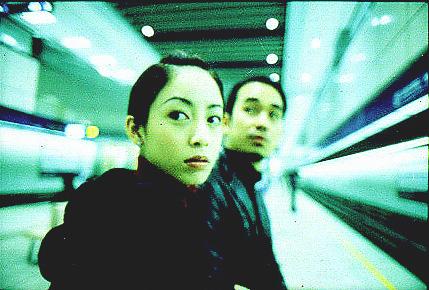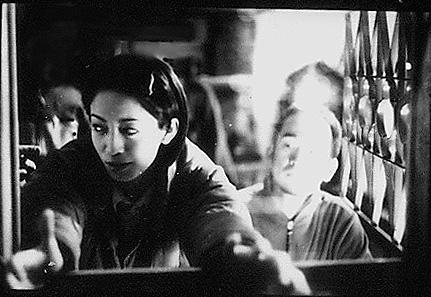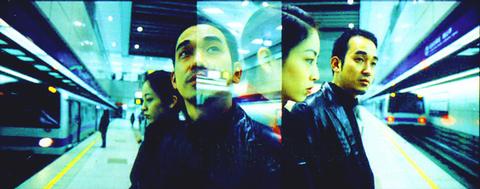Taiwanese filmmaker Hsiao Ya-chuan (
Hsiao is known as one of the best young filmmakers in Taiwan and has taken a large step in broadening his recognition abroad with Mirror Image which was shown in the Directors' Fortnight portion of the Cannes festival.

PHOTO COURTESY OF HSIAO YA-CHUAN
Mirror Image will compete for the Camera d'Or, a prize for first-time feature film directors. And on Saturday Hsiao was awarded the festival's youth award issued by a panel of seven French film critics to recognize films that represent young people's lives and stories.

PHOTO COURTESY OF HSIAO YA-CHUAN
Hsiao has also received funds and promotion plans for Mirror Image and his next two filmmaking projects from French film companies. Celluloid Dreams, which has distributed Tsai Ming-liang's (
Mirror Image involves a game of flirtation between a man and two women in Taipei, each of whom is trying to manipulate the others' fate and lives. Shot in a playful, humorous style with jazzy background music, the story focuses on the main character Tung-chin's (

Tung-chin was recently in a car accident which left him with a scratched palm and was told later by his nurse that without a lifeline on his palm he was now in control of his own fate, something which he has come to believe quite strongly.
Eiko, Tung-chin's girlfriend, is an avid palm reader who hangs out at the pawnshop. The two of them use different ploys to get prints of customers' palms. But the palm lines that Eiko is most interested in is Tung-chin's. She wants to know more about his future. Meanwhile, Tung-chin begins an affair with a female customer named Xiao De-le (
"I think Tung-chin has fooled himself," Hsiao said at a press conference at Cannes last week. "For me a lifeline is meant to be a limit to one's life. And losing his lifeline makes Tung-chin believe in a false idea that he has broken the limits," he said.
"So he is like a guinea pig that I created for my experiment, who in the end reverts back to his original limits, back to an ordinary life."
"This is also true for the two girls, who tried to break free of control in their own different ways but find themselves trapped by their own limits that they set up."
The playful environment that Hsiao portrays in his film through his camera work and humorous story was also a hot topic of discussion at the festival.
"Before I start shooting, I usually have the rhythm and structure of the images in my mind, which I perceive as important elements in my film," Hsiao said.
For Peggy Chiao (
Hou is in fact one of the producers of Mirror Image. Hsiao was previously a student of Hou's and worked as deputy director on Hou's Shanghai Flowers (

Jacques Poissant’s suffering stopped the day he asked his daughter if it would be “cowardly to ask to be helped to die.” The retired Canadian insurance adviser was 93, and “was wasting away” after a long battle with prostate cancer. “He no longer had any zest for life,” Josee Poissant said. Last year her mother made the same choice at 96 when she realized she would not be getting out of hospital. She died surrounded by her children and their partners listening to the music she loved. “She was at peace. She sang until she went to sleep.” Josee Poissant remembers it as a beautiful

For many centuries from the medieval to the early modern era, the island port of Hirado on the northwestern tip of Kyushu in Japan was the epicenter of piracy in East Asia. From bases in Hirado the notorious wokou (倭寇) terrorized Korea and China. They raided coastal towns, carrying off people into slavery and looting everything from grain to porcelain to bells in Buddhist temples. Kyushu itself operated a thriving trade with China in sulfur, a necessary ingredient of the gunpowder that powered militaries from Europe to Japan. Over time Hirado developed into a full service stop for pirates. Booty could

Before the last section of the round-the-island railway was electrified, one old blue train still chugged back and forth between Pingtung County’s Fangliao (枋寮) and Taitung (台東) stations once a day. It was so slow, was so hot (it had no air conditioning) and covered such a short distance, that the low fare still failed to attract many riders. This relic of the past was finally retired when the South Link Line was fully electrified on Dec. 23, 2020. A wave of nostalgia surrounded the termination of the Ordinary Train service, as these train carriages had been in use for decades

Lori Sepich smoked for years and sometimes skipped taking her blood pressure medicine. But she never thought she’d have a heart attack. The possibility “just wasn’t registering with me,” said the 64-year-old from Memphis, Tennessee, who suffered two of them 13 years apart. She’s far from alone. More than 60 million women in the US live with cardiovascular disease, which includes heart disease as well as stroke, heart failure and atrial fibrillation. And despite the myth that heart attacks mostly strike men, women are vulnerable too. Overall in the US, 1 in 5 women dies of cardiovascular disease each year, 37,000 of them